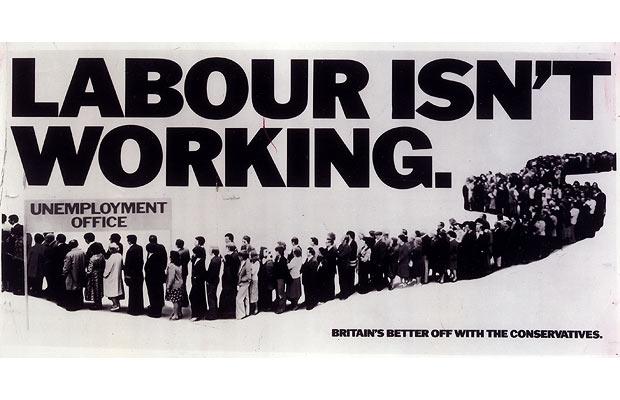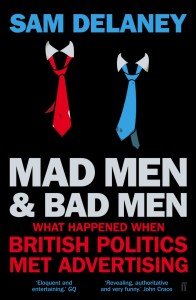Mad Men & Bad Men: What happened with British politics met advertising by Sam Delaney

 Mad Men & Bad Men: What happened with British politics met advertising by Sam Delaney contains a cracking set of anecdotes as the author managed to speak to just about every important person involved in doing or commissioning advertising for Labour or the Conservatives over the last few decades.
Mad Men & Bad Men: What happened with British politics met advertising by Sam Delaney contains a cracking set of anecdotes as the author managed to speak to just about every important person involved in doing or commissioning advertising for Labour or the Conservatives over the last few decades.
Other parties are notable by their absence, though to be fair the most famous political adverts are all for Labour or the Tories and it’s a great sweep through political history.
There is a touch of the after-dinner speech anecdotes about some of the accounts from advertising men and HQ teams, especially as I noticed some slips with the facts of the sort that exaggerate the story and the role of the speaker. (Mentioning positively Labour’s Brecon and Radnor by-election campaign, for example, without mentioning that the Liberals leapfrogged Labour to take the seat is being rather overkind to Labour.)
More substantively frustrating, however, is that although many of the stories involve people making reference to evidence about advertising’s impact (or not) on election results, the evidence briefly cited is vague, contradictory and not followed up by the author. Instead, it’s on to the next person, their own lively tales and, possibly, their brief reference to different evidence.
It’s only near the end of the book that Sam Delaney really gets stuck into considering whether political advertising makes any difference. It’s a consideration that is delivered more based on assertion by participants rather than him taking the reader through market research evidence, polling data or results analysis, all three of which get barely a look in.Indeed, the brief reference to polling data around the 1987 general election is another of those after-dinner speech style pieces of simplified exaggeration. (If you look in detail at the fieldwork dates for the 1987 opinion polls, the immediate impact of Labour’s notorious Sheffield Rally wasn’t a swing to the Tories but no impact – some polls showing a move one way, others the other way.)
That said, Delaney’s conclusion is a sound one:
Researchers say that there is no statistical evidence to show that exposure to advertising influences people’s voting choice. Admen, the good ones anyway, help politicians to put their complicated ideas into succinct packages. They help them to focus their strategies, and the ads they make can help signpost elaborate, multifaceted political debates for the press and the public.
Along the way to that conclusion, the stories are brilliant – especially the tale of admen spiking the food for a meeting with Conservative politicians in Ted Heath’s time so as to help excite them about their advertising plans. Bizarre, even if greatly exaggerated.
That makes the book a great read, even if one that does more to entertain that to provide evidence for the reader really to answer the question, “does political advertising make a difference?”.
If you like this, you might also be interested in Dole Queues and Demons: British election posters from the Conservative Party Archive.
Buy Mad Men & Bad Men: What happened with British politics met advertising by Sam Delaney here.
Leave a Reply